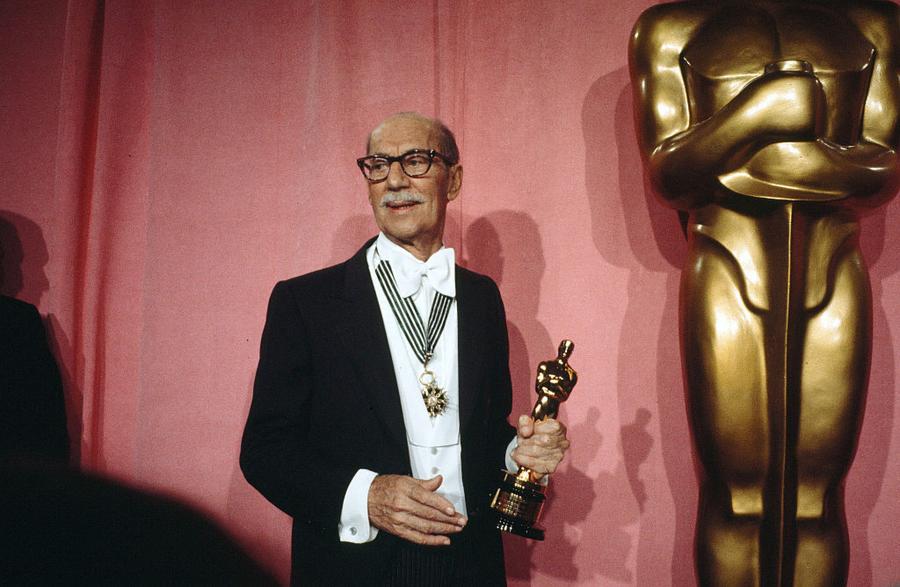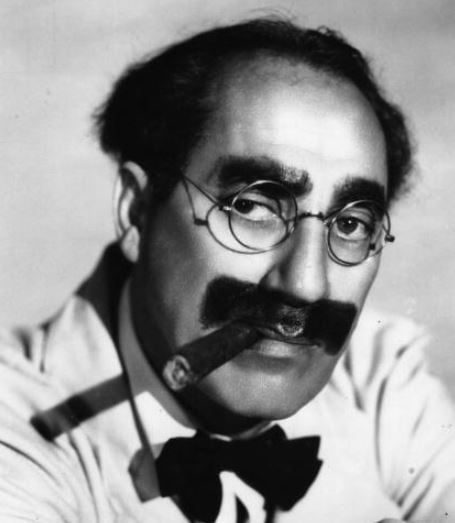What Was Groucho Marx’s Net Worth?
Groucho Marx was an American comedian, writer, and actor who had a net worth of $2.8 million at the time of his death on August 19, 1977. That’s the same as $12 million in today’s dollars (after adjusting for inflation). After his death, several family members fought bitterly over the estate. In the end, not much was left after several years of legal battles.
Groucho Marx is considered to be one of the greatest comedians of all time and made more than a dozen feature films along with his siblings as the Marx Brothers. Groucho hosted the television game show “You Bet Your Life” from 1950 to 1961. He starred in several films as part of the Marx Brothers, including “Humor Risk” (1921), “The Cocoanuts” (1929), “Animal Crackers” (1930), “The House That Shadows Built” (1931), “Monkey Business” (1931), “Horse Feathers” (1932), “Duck Soup” (1933), “A Night at the Opera” (1935), “A Day at the Races” (1937), and “A Night in Casablanca” (1946). He also authored several books, such as “Groucho and Me” (1959), “Memoirs of a Mangy Lover” (1963), and “The Groucho Phile: An Illustrated Life” (1976). Marx won an Honorary Academy Award as well as a Primetime Emmy Award and received two stars on the Hollywood Walk of Fame. Groucho Marx passed away on August 19, 1977, at 86 years old. At the time of his death, his estate was worth $2.8 million, roughly $12 million in today’s dollars. After his death, several family members fought bitterly over the estate. In the end, not much was left after several years of legal battles.
Early Life
Groucho Marx was born Julius Henry Marx on October 2, 1890, in Manhattan, New York City. During a 1969 interview with Dick Cavett, Marx said that he was born on East 78th Street above a butcher’s shop. Groucho and his brothers, Chico, Harpo, Gummo, and Zeppo, grew up in a Jewish household on Manhattan’s Upper East Side in what is now known as the Carnegie Hill neighborhood. Marx’s mother, Miene “Minnie” Schoenberg, came to the U.S. from northern Germany with her family as a teenager, and his father Simon “Sam” Marx (née Marrix), came from France. Groucho’s paternal uncle was Al Schoenberg, who was professionally known as Al Shean and was half of the vaudeville act Gallagher and Shean. Marx originally wanted to become a doctor, but his family needed money, so he was forced to leave school when he was 12 years old. After trying a few entry-level office jobs, he began singing with the Gene Leroy Trio in 1905.
Hulton Archive/Getty Images
Career
By 1909, Marx’s mother, Minnie, had assembled Groucho, Gummo, and Harper into the vaudeville singing group The Four Nightingales (which also included a young singer named Lou Levy). The group didn’t find the success Minnie had hoped for, and the family subsequently moved to La Grange, Illinois, and began performing in the Midwest. At a Tennessee performance, the brothers began cracking jokes onstage, and the audience seemed to enjoy their comedy more than their music. They modified the comedy skit “School Days” (by Gus Edwards) into a skit called “Fun In Hi Skule” and performed variations of it for the next seven years. They eventually became the Palace Theatre’s biggest comedic stars; the New York venue dubbed itself the “Valhalla of Vaudeville.” Chico’s deal-making skills led to three plays on Broadway, which were all hits. Zeppo joined the group after Gummo left to serve in World War I, and that’s when they began going by the name the Marx Brothers.
Groucho appeared in 26 films, and half of them were with his brothers Harpo and Chico. The first Marx Brothers film was 1921’s “Humor Risk,” a silent movie that was only screened once. Next, they starred in “The Cocoanuts” (1929) and “Animal Crackers” (1930), which were both based on their Broadway musicals. The Marx Brothers followed those films with “Monkey Business” (1931), “Horse Feathers” (1932), “Duck Soup” (1933), “A Night at the Opera” (1935), “A Day at the Races” (1937), “Room Service” (1938), “At the Circus” (1939), “Go West” (1940), “The Big Store” (1941), “A Night in Casablanca” (1946), “Love Happy” (1949), and “The Story of Mankind” (1957). Groucho also appeared in films such as “Copacabana” (1947), “Mr. Music” (1951), “Double Dynamite” (1951), “A Girl in Every Port” (1952), and “Skidoo” (1968). He was a radio comedian as well, and he began hosting “You Bet Your Life,” a radio quiz program, in 1947. The show moved to television in 1950, where it aired for 11 years. In 1962, Marx hosted the CBS game show “Tell It to Groucho,” and in 1965, he starred on the British series “Groucho,” which was similar to “You Bet Your Life.”
Personal Life
Groucho married three times, and each marriage ended in divorce. He wed Ruth Johnson, a chorus girl, on July 17, 1954, when she was 19 and he was 29. They welcomed two children, Miriam and Arthur, before divorcing in July 1942. Marx was married to Kay Marvis from February 1945 to May 1951, and they had a daughter named Melinda together. At the time of the wedding, Kay was 21 and Groucho was 54. In July 1954, 64-year-old Groucho married 24-year-old actress Eden Hartford. Marx described his perfect woman as “someone who looks like Marilyn Monroe and talks like George S. Kaufman.” Though he didn’t have a formal education, Groucho wrote several books, such as 1959’s “Groucho and Me” and 1963’s “Memoirs of a Mangy Lover.” In his 1976 book “The Groucho Phile,” Marx said of politics, “I’ve been a liberal Democrat all my life.” He added, “I frankly find Democrats a better, more sympathetic crowd…. I’ll continue to believe that Democrats have a greater regard for the common man than Republicans do.”
Death
On June 22, 1977, Groucho was hospitalized with pneumonia at Cedars-Sinai Medical Center. He died there on August 19th at the age of 86. Coverage of his death and legacy was overshadowed by the fact that Elvis Presley had died three days earlier. Marx was cremated, and his ashes were interred at L.A.’s Eden Memorial Park Cemetery. Litigation over his estate went on into the ’80s, and his children eventually received the bulk of Groucho’s estate. Erin Fleming, his partner during the final years of his life, was ordered to repay more than $470,000.

(Photo by Michael Montfort/Michael Ochs Archives/Getty Images)
Awards and Honors
In 1951, Marx won a Primetime Emmy for Most Outstanding Personality, and in 1974, he received an Honorary Award at the Academy Awards “in recognition of his brilliant creativity and for the unequaled achievements of the Marx Brothers in the art of motion picture comedy.” In 2018, the Marx Brothers were inducted into the Online Film & Television Association Hall of Fame in the Acting category. Groucho received two stars on the Hollywood Walk of Fame in 1960, for Television and Radio.
Real Estate
In 2019, Groucho’s former Hollywood Hills home sold for $3.67 million. Marx sold the 3,700-square-foot home for $35,000 in 1949, which would’ve been approximately $375,000 in 2019. The four-bedroom home was built in the mid-1930s, and the property includes a swimming pool and a spa.
All net worths are calculated using data drawn from public sources. When provided, we also incorporate private tips and feedback received from the celebrities or their representatives. While we work diligently to ensure that our numbers are as accurate as possible, unless otherwise indicated they are only estimates. We welcome all corrections and feedback using the button below.

